- Home
- Chris Grabenstein
Free Fall Page 15
Free Fall Read online
Page 15
“Gosh, no,” says Judith, sounding all sugar-frosted corn-flakey again. “I just didn’t want anybody around this table raising red flags.”
“Now then,” says the lawyer, before he does a good throat clearing. “To the particulars of his estate. As I said previously, Arnold’s will is neither complicated nor complex. He left two specific bequests of monies to be drawn from the sale of all his investments and assets and asked that they be cited as a mitzvah. To his devoted caregivers, Monae Dunn and Christine Lemonopolous, he bequeaths fifty thousand dollars. Each.”
Christine and Monae both sort of gasp.
Hey, I don’t blame them. I would, too.
Then Monae starts flapping her hand in front of her face like she’s about to faint. “Fifty thousand dollars?” she squeals. “This is better than hitting the Lottery!”
Judith Rosen? She’s fuming.
“The remainder of his estate,” says the lawyer, “which, given current market positions, land values, and comparable real estate sales in Cedar Knoll Heights, our accountants conservatively estimate at two point two million dollars, Dr. Rosen leaves to David and Judith Rosen in trust for his quote living legacy end quote Arnold David Rosen.”
Little Arnie. The smiling blonde kid in all the photographs is an instant millionaire. Unless, of course, his parents blow it all on guitar lessons, Bart Simpson watches, and liposuction before he hits twenty-one.
This is why Judith wasn’t pleased when Christine and Monae scored their fifty thousand dollars each. That little mitzvah cost her family one hundred thousand dollars. Still, two point one million dollars is nothing to sneeze at. It’s better than beer and pretzels rich. It’s practically Adele Ceepak rich.
“This isn’t fair,” protests Michael, his voice trembling.
“Really?” says the lawyer. “I’m surprised to hear you say that, Michael. Surely you can’t begrudge your nephew his inheritance. You earn nearly that much in two weeks.”
“This isn’t about money.” Michael says with a laugh even though I can tell he is spitting mad. “This is about fairness. This is about family.”
“I beg your pardon?”
“My partner Andrew and I recently adopted a child. An African-American boy we named Kyle.”
“Was your father aware of this?”
“I told him Friday night. At dinner.”
“That was his ‘big announcement,’” says David.
Judith sniggers.
Michael? He looks like he could weep. Or explode. Maybe both.
“I’m so sorry, Michael,” says the lawyer. “Perhaps, had he lived longer, your father would’ve once more amended his last will and testament to include your son as well.”
“No,” says David. “He wouldn’t have. We talked about it at dinner on Friday night. Dad thought Michael and his ‘partner’ pretending that they were parents was stupid. Dad didn’t believe in adoption. He believed in bloodlines. And legitimate heirs.”
“Dad was all about real family,” adds Judith. “When you adopt you’re not extending the family tree, you’re simply taking on somebody else’s problems.”
“You, Judith,” says Michael, sounding completely heartbroken, “are a fat, repulsive bitch.”
Yowser.
“Watch your mouth, little brother,” snaps David. “That’s my wife you’re talking about.”
“I know who and what she is—a hideous and heartless cow.”
“Gentlemen?” says the lawyer, banging the table with his fist like it’s a gavel.
Michael storms out of the room.
David and Judith shake their heads as if to say, “Poor, poor Michael.” Then they smile a little to savor their triumph.
Christine? She’s looking at me with a very nervous expression on her face.
I’m kind of looking at her the same way.
Because I have to wonder: Did the last elderly patient she took care of, Mrs. Mauna Faye Crabtree, also leave her a little sumpin’-sumpin’ in her will like Dr. Rosen did? Are deathbed bequests the bonuses of the home health aide trade?
If so, Christine might’ve had a solid motive for helping ease another one of her patients out the exit door.
42
BRIGHT AND EARLY MONDAY MORNING, CEEPAK AND I ARE IN his office sipping bad coffee from mugs we poured out of the desk sergeant’s congealed pot and working the phones.
It doesn’t get any more detective-y than that.
Ceepak’s in his blazer and khaki cargo pants. I think there’s a zipper near the knees if he wants to turn them into shorts later in the afternoon. He seldom does.
I’m in cargo shorts and my favorite FDNY Engine 23 T-shirt. It’s been lucky for me in the past. Both of us are carrying sidearms.
We have a busy day ahead of us.
My first call of the morning is to Christine. I tag her on her cell because my apartment doesn’t have a landline. Landlines are like e-mail: so two thousand and late.
I go over the list of all the elderly patients she’s taken care of since losing her job at Mainland Medical.
“They’re all dead, Danny,” she tells me. “But that doesn’t mean I killed them.”
It also doesn’t mean I won’t be making a few more phone calls to the families of the deceased to see if any of Christine’s other patients died suddenly or under suspicious circumstances.
Ceepak spends his coffee and phone time with Bill Botzong at the Major Crimes Unit.
They’re trying to track down and trace any shipments of potassium cyanide into Sea Haven. Botzong and his team will be doing some serious data mining with all the known suppliers of the chemical compound, cross-referencing their records against the names and addresses of all our suspects, including Joy Kochman up in Lavallette, whom we will be visiting just as soon as we finish up our phone calls and hit the head.
Bad coffee? It’s like beer. You can’t buy it. You can only rent it.
We hop into Ceepak’s Batmobile and cruise up the Garden State Parkway toward Seaside Heights.
“Fascinating,” mumbles Ceepak, somewhat randomly, seeing how we’re basically humming up a generic highway filled with generic cars surrounded by garden-variety Garden State evergreen trees.
“You and I have dealt with several murderers in the past, Danny. In all those instances, the killer had to brutally confront their victim. They possessed strength, skill, or, at the very least, a warped sense of courage.”
“But in this case,” I say, “all the killer had to do was plop a pill into a plastic box and wait.”
“Precisely. It is the easiest murder to execute, perhaps the most difficult to solve.”
Because there’s not much evidence. When you use your strength, skill, or warped courage, you leave clues. When you plop a single pill into a slot, not so much.
Unless, of course, our killer was foolish enough to order a pound of cyanide on the Internet and have it shipped to his or her home.
“What about jewelry stores?” I say. “Should we see if any of our suspects have a connection with a business with a legitimate use for the cyanide?”
“Indeed so.”
Maybe we’ll get lucky. Maybe one of the cyanide buyers will be the store where Judith’s sister Shona buys all her clunky gold bracelets and baubles.
323 Bayview Drive in Lavallette is a two-story townhouse in a New England-looking condo complex on the bay side of the Barnegat Peninsula.
I read somewhere that young people with kids like the beach and surf side of any island; older folks like the calmer waters and boat docks on the bay side. In Lavallette, that’s the side where the sun sets, too. Makes sense, I guess. You probably watch more sunsets when you’re in your twilight years.
Joy Kochman is working as a live-in home health aide for a cranky couple called the Silberblatts.
“They both have Alzheimer’s,” she explains when we join her in the kitchen where she’s toweling up a mess that might’ve been breakfast. Lumpy puddles are splattered all over the kitchen table. I�
�m thinking oatmeal and bananas. “Mr. Silberblatt likes to sleep on the floor. His wife? She likes to wander. We had to pin her name and address on her blouse, like she was in pre-school.”
“Do you have a moment to answer a few questions?”
“Yeah. The meds kicked in. They’re taking naps in front of the TV. Let’s Make A Deal is good for that.”
Nurse Kochman looks to be forty, maybe fifty. Then again, she could be a lot younger. I have a feeling living full-time with the Silberblatts puts bags under your eyes. Her hair is cut short and combed to the side. Some streaks are brighter than others but you can tell she doesn’t have much time to fuss with it. She’s dressed in dark blue scrubs, the better to hide oatmeal splotches.
“As you may know,” says Ceepak, “your former employer, Dr. Arnold Rosen, passed away this weekend.”
“Yes. I read about that. Sorry I couldn’t make it to the services.” She opens up her arms in a gesture that takes in the enormity of her task as the Silberblatts’ caregiver.
“Understandable,” says Ceepak. “But you visited Dr. Rosen late last week?”
“Thursday. It’s my night off. One of the Silberblatts’ kids comes over, relieves me. They’re great. Five sons who live in the area. They all really love their parents even though their parents hardly even recognize them any more. We’re all starting to think Mom and Dad might be better off in a nursing home. But well, the boys want to keep them here, in familiar surroundings, for as long as possible.”
“How do the Silberblatt children compare to Dr. Rosen’s?” asks Ceepak, smoothly steering the interview in the direction he wants it to go.
Nurse Kochman makes a lip fart noise.
Sorry. She does.
“Night and day. These kids? They’re kind and respectful. To me and their parents. Those Rosens? What a nasty pair of vipers.”
Up goes Ceepak’s quizzical eyebrow. “How so?”
“David wanted me to spy on his dad. Feed him medical information. I refused. Michael? He just flashed a lot of cash. Showered his father with gifts he either didn’t want or couldn’t use. Michael’s filthy rich. Does all those ‘Crime And Punishment’ shows. ‘Crime And Punishment New York,’ ‘Crime And Punishment Chicago, Hawaii, San Francisco, Wherever.’ He makes like fifty million dollars a year. I saw it in People magazine. He’s the one who sent Monae to Dr. Rosen’s house. Apparently, he owed her sister, a woman named Raven …”
“Revae,” I say.
Kochman shrugs. “Whatever. Michael owed this Revae a favor so he insisted that Dr. Rosen hire Monae to work the night shift.”
“Let’s go back to David and his wife, Judith,” says Ceepak. “What happened after you refused to feed them information?”
“They accused me of stealing Dr. Rosen’s solid gold cufflinks.”
“Did you?”
“Of course not.” She holds up her arms. “I wear a uniform every day. No cuffs. Look, guys, Dr. Rosen was still with-it, but he was also old and cufflinks are small. He forgets where he put things.”
“Did you protest the accusations?”
“I said I didn’t do it, if that’s what you mean. But let’s be honest here: When you’re a home health aide, it’s not like you’re in a union or even a regular employee. Don’t call the IRS, but a lot of these families pay us off the books. When the person paying you says you’re fired, trust me, detectives, you’re fired.”
“So Dr. Rosen fired you?”
“That’s what David said. Dr. Rosen, himself, was taking a nap at the time.”
“Did you meet your replacement?” I ask. “Christine Lemonopolous.”
“Nope. And I didn’t want to. I figured the only reason she was hired was because she said yes to everything I’d said no to. Later, after I landed this job with the Silberblatts, I asked around. Talked to a few friends. Got a pretty good picture of who this Lemonopolous girl was and what she’d do to make money.”
“Care to enlighten us?” says Ceepak.
“Word is, she went nuts. Quit her high-paying job in the emergency room at Mainland Medical. She’s been scrounging around ever since, getting by with home health aide work. My friend Beatrice told me that this Lemonopolous gal worked for some sick rich kid at night in exchange for room and board. For cash, she did days with whatever old person she could bamboozle into thinking she was a sweetie-pie. Maybe it’s a coincidence, but all the old people who hired this Christine Lemonopolous didn’t live too long after she went to work in their homes. Most made it two months, maybe three. Just long enough to write her into their will.”
“Dr. Rosen did that,” I mumble. “Bequeathed her fifty thousand dollars.”
“I rest my case. I’m surprised you guys caught her. Nobody else ever asked any questions because, from what I heard, she only takes jobs that are, basically, death watches. It’s a pretty nifty little plan, if, you know, you don’t have any scruples or a conscience.”
Ceepak and I both nod grimly. Because, face it, neither one of us really, truly knows what makes Christine Lemonopolous tick. What kind of thoughts she harbors in her heart. We just wanted to help her when she was in a jam.
We might’ve also helped her get away with murder.
43
MEANS, OPPORTUNITY, MOTIVE.
Christine had all three.
Provided, of course, she knew how to get her hands on some potassium cyanide.
“We need to chat with Christine again,” says Ceepak.
“What about Revae Dunn?” I ask.
“I think it’s more important that we speak with Christine. Immediately.”
“Should I set it up?”
Okay. I’m stalling. I’m half-hoping Ceepak will say something like, “Ah, let’s forget this one. Arnold Rosen was going to die anyhow and Christine is cute. So let’s go grab a beer and ask Christine to join us.”
But he doesn’t.
“Please do,” he says. “And Danny?”
“Yeah?”
“For what it’s worth, I will be greatly surprised if these rumors and accusations prove to be true. I suspect Christine is the unfortunate victim of idle gossip.”
Okay. That makes me feel a little better.
Until I call Christine.
“Hey,” I say when she answers the phone.
“Hey.” She doesn’t sound very cheery.
“You busy?”
“Sort of.”
“Ceepak and I need to talk to you again.”
“Danny?”
“Yeah?”
“Why are all these people calling me?”
“What people?”
“Let’s see. The Bollendorfs. The Crabtrees. Janet Malone. Addie Galloway. All the people whose parents I worked for before I went to work for Dr. Rosen.”
“Well …”
“Did you really ask Jodi Bollendorf if her dad died ‘under mysterious circumstances?’”
I sigh into the phone. “It’s my job, Christine.”
“To do what? Ruin my life?”
“No. Find out the truth.”
“I’m telling you the truth.”
“Yes. I think you are.”
“You think I am?”
Okay. Bad choice of words.
“Can you swing by the police station and talk to us?” I say. “Or, if you like, we can come back to my apartment and …”
She cuts me off. “The police station.”
“Great. Say in half an hour?”
“No. My lawyer can’t be there till three.”
“Your lawyer?”
“Harvey Nussbaum.”
“You hired a lawyer?”
“It is her right to consult with an attorney,” says Ceepak, who’s, of course, listening to my side of the conversation. “And to have that attorney present during questioning.”
Great. My partner’s giving me the Miranda warning.
“Okay,” I say. “Three o’clock. Bring Harvey.”
“Danny?”
“Yeah?”
&nbs
p; “I thought we were …”
“What?”
“Never mind.”
And she hangs up in my ear.
44
SO, WE HAVE A FEW HOURS TO TRACK DOWN REVAE DUNN.
She works as the office manager at a place called “The Garden State Reproductive Science Center,” about half a mile away from Mainland Medical in Avondale.
It’s a very medical-looking building. Lots of dark windows and sterile stucco walls. The islands of grass sprinkled around the asphalt parking lot look like they get manicured instead of mowed. As we pull into a visitor parking spot, I notice that Michael has been even more generous to Revae Dunn than her sister.
In a parking slot “Reserved For Office Manager,” I see a bright red Jaguar XKR convertible. Those kitty cats cost over a hundred thousand dollars. That’s right. More than some houses.
“Michael Rosen sure likes the Dunn sisters,” I mumble as we climb out of Ceepak’s car, which, all of a sudden, doesn’t seem all that super dooper any more.
“Indeed,” says Ceepak, admiring the convertible. “And judging by their vehicles, I believe Revae is his favorite.”
Revae Dunn agrees to talk to us.
“For five minutes. We’re very busy.”
We’re in her nice, gray-on-gray-carpeted office. She’s dressed in a crisply starched linen business suit the color of a dove. Her hair is perfectly coiffed. Her earrings match her necklace, which matches her bracelet. The woman has style.
“Ms. Dunn,” says Ceepak, “given your rigid time constraints, kindly allow me to be blunt: Why did the wealthy Hollywood producer Michael Rosen buy you a Jaguar convertible worth well over one hundred thousand dollars?”
“Who said he did?”
“Me. We know that Dr. Rosen also purchased a car for your sister Monae and, at your insistence, procured her a position as a home health aide at Dr. Arnold Rosen’s home in Sea Haven.”
“Who are you again?”
“John Ceepak. Chief of Detectives. Sea Haven PD. This is my partner, Detective Boyle.”
Revae Dunn glances at her wristwatch.

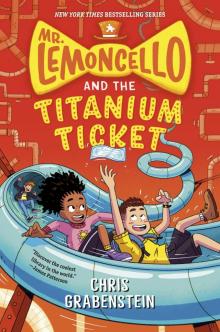 Mr. Lemoncello and the Titanium Ticket
Mr. Lemoncello and the Titanium Ticket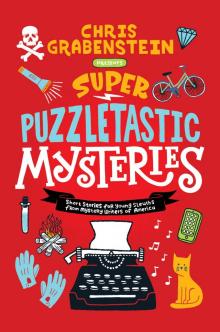 Super Puzzletastic Mysteries
Super Puzzletastic Mysteries Sandapalooza Shake-Up
Sandapalooza Shake-Up Welcome to Wonderland #4
Welcome to Wonderland #4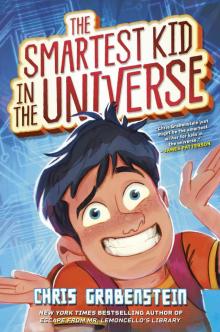 The Smartest Kid in the Universe
The Smartest Kid in the Universe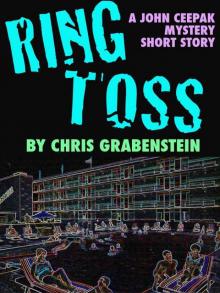 RING TOSS A John Ceepak Mystery Short (The John Ceepak Mysteries)
RING TOSS A John Ceepak Mystery Short (The John Ceepak Mysteries)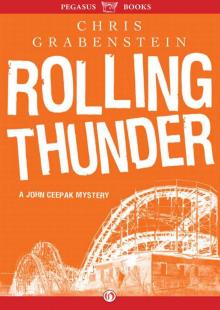 Rolling Thunder (John Ceepak Mystery)
Rolling Thunder (John Ceepak Mystery) Don't Call Me Christina Kringle
Don't Call Me Christina Kringle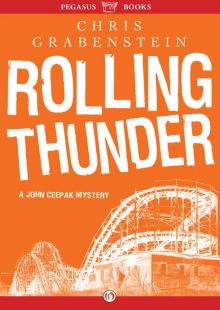 Rolling Thunder
Rolling Thunder The Crossroads
The Crossroads Hell Hole
Hell Hole Beach Party Surf Monkey
Beach Party Surf Monkey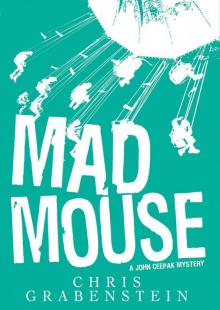 Mad Mouse: A John Ceepak Mystery (The John Ceepak Mysteries)
Mad Mouse: A John Ceepak Mystery (The John Ceepak Mysteries) Mind Scrambler
Mind Scrambler Home Sweet Motel
Home Sweet Motel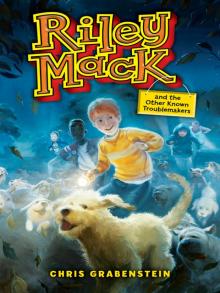 Riley Mack and the Other Known Troublemakers
Riley Mack and the Other Known Troublemakers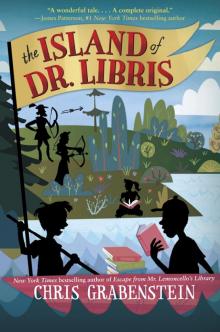 The Island of Dr. Libris
The Island of Dr. Libris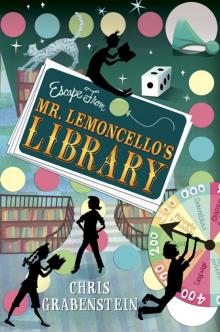 Escape From Mr. Lemoncello's Library
Escape From Mr. Lemoncello's Library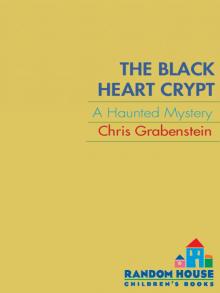 The Black Heart Crypt
The Black Heart Crypt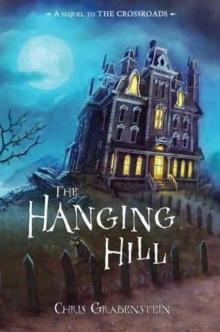 The Hanging Hill
The Hanging Hill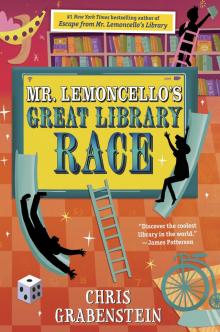 Mr. Lemoncello's Great Library Race
Mr. Lemoncello's Great Library Race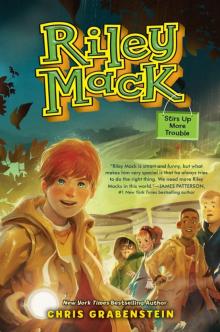 Riley Mack Stirs Up More Trouble
Riley Mack Stirs Up More Trouble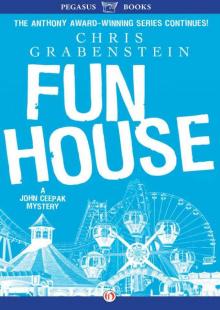 Fun House (John Ceepak Mystery)
Fun House (John Ceepak Mystery)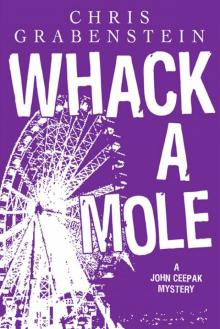 Whack A Mole: A John Ceepak Mystery (The John Ceepak Mysteries)
Whack A Mole: A John Ceepak Mystery (The John Ceepak Mysteries)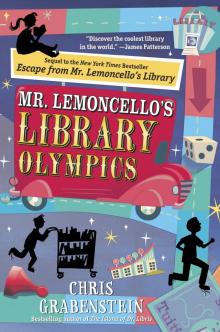 Mr. Lemoncello's Library Olympics
Mr. Lemoncello's Library Olympics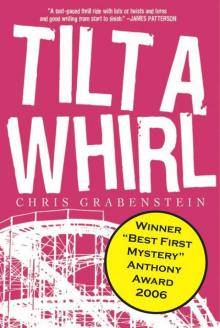 Tilt-a-Whirl jc-1
Tilt-a-Whirl jc-1 The Explorers’ Gate
The Explorers’ Gate The Smoky Corridor
The Smoky Corridor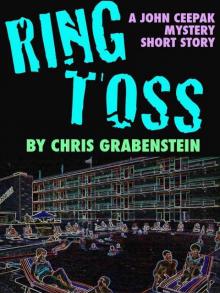 Ring Toss (john ceepak)
Ring Toss (john ceepak)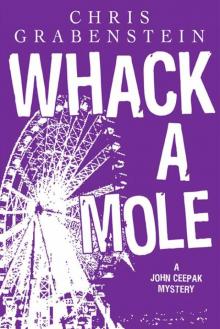 Whack A Mole jc-3
Whack A Mole jc-3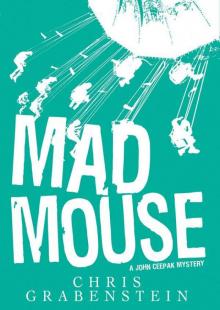 Mad Mouse js-2
Mad Mouse js-2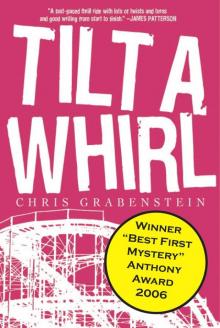 Tilt-a-Whirl (The John Ceepak Mysteries)
Tilt-a-Whirl (The John Ceepak Mysteries) Free Fall
Free Fall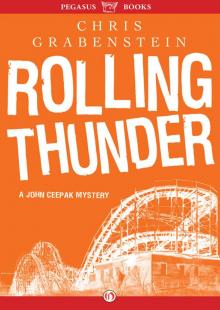 Rolling Thunder jc-6
Rolling Thunder jc-6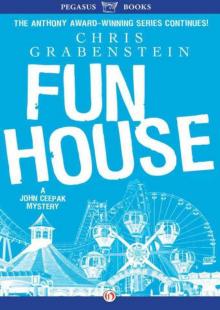 Fun House jc-7
Fun House jc-7